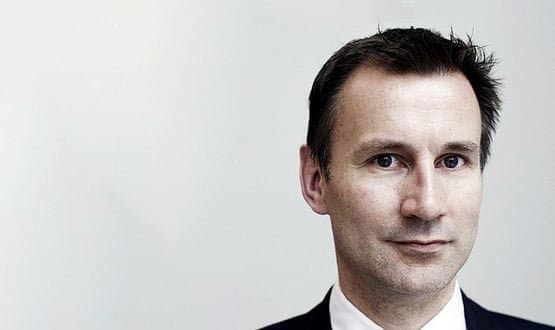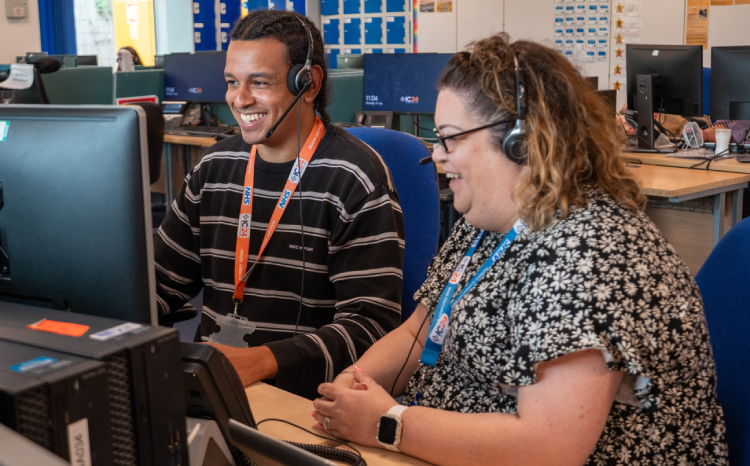Hunt says technology will create “patient power decade” in NHS

Jeremy Hunt has announced a series of new promises on online access to healthcare information, with a view to ensuring the next 10 years come to be known as the NHS’s “patient power decade”.
In a keynote speech which yesterday closed the 2017 Health and Care Innovation Expo, the secretary of state for health said that new online services will be in place by the end of next year.
This includes app or online access for all patients to the NHS urgent but non-emergency 111 service.
All patients will also be able to access their own GP medical record through an app, and use online means to detail the ways in which they do and do not want their information shared.
Hunt said this would be a means of addressing controversies over whether people should have to explicitly opt in or opt out of their anonymised data being shared for research.
These were exemplified by the care.data programme, which was scrapped in part because of concerns around consent.
“We want to transform that debate for NHS patients by saying that whatever your preferences are, you can go online at any time, access your medical record, and through an app change those preferences in one direction or another.”
Such a setup would be the first in the world, Hunt reported.
He indicated that in the longer term the aim was to “marry” medical records and apps. Linking online 111 to patient information would mean a symptom checker could ask questions appropriate to that individual, he said.
“That would mean you could have a smart Q&A service, which would mean much more accurate diagnosis, a quicker diagnosis and a much better service for patients. Also, of course, a cheaper service for the NHS.”
He suggested there were similar plans for the programs available via the NHS App Library. This suite of apps – not built by the NHS, but checked and approved by it – could ‘quiz’ users’ medical records.
“For example if you have diabetes and you’re put on an exercise programme by your GP, if you give your consent, then information from your Fitbit can find its way through an app onto your medical record, so that you can have a discussion with your doctor about how much exercise you’re actually doing. This I think will be very transformative.”
Hunt also announced that 90 additional datasets had been added to MyNHS, the website intended to help patients compare the performance of their local care services.
He said a £100,000 MyNHS open data challenge was being launched, “for the best apps and ideas that harness for information for the benefit of NHS patients”.
Amid the focus on the digital patient, Hunt stressed that alternative means of access would always be available for those who did not want to use internet-enabled services. But, he said, “we recognise how many people, particularly older people, actually do want to get online”.
This is why, he said, he was announcing the creation of 20 more digital inclusion hubs over the next three years, designed to help more people benefit from online health services.
As expected, the secretary of state also used his speech to announce the first of the global digital exemplar (GDE) fast followers. These organisations will partner with existing GDEs, with the intention of rapidly accelerating their digital maturity.
Hunt named 18 fast follower trusts, which will each receive up to £5 million of government funding. They will be expected to match that investment.
He said there was the intention to name seven mental health fast followers in due course, and that the fast follower list was a “fluid” one.
“If you’re not on it just yet, that doesn’t mean to say that you won’t have the opportunity to get on the list.”
The first wave of acute GDEs were named at last year’s Expo conference, as a response to Bob Wachter’s review of NHS IT.





8 Comments
Data Quality within our NHS is a significant issue, I have worked @ Trusts in Scotland where I was told that the policy was to be completely honest and open about it. When I was, and told people outside of the Team but within the Trust, that the primary key for some classes was a name instead of a code (e.g. Sunshine Ward instead of code “A1203”, names can and do change, codes very rarely !), my employment contract was terminated. The quality of the data across different trusts within our NHS varies enormously. In my personal and honest opinion the responsibility for the variation should lie within our NHS, @ the national levels. Despite the variation, you can not stop progress, and our NHS must push on with IT. One option is for our NHS to ask the people it serves for help, to ask them to be patient … to be open and honest and ask them for help in “tidying” up their data. The launching of the Digital Academy will help, but what is needed is not just confidence but competence, the type of competence that comes with experience (a pilot can’t fly a passenger plane until he has put in the air miles), managers may plan and monitor but please don’t pretend you can be involved in the building unless you can act ually build. Politicians set the strategy, and I think “patient power” is right for future generations, but I remember a previous PM setting a target for patients to be able to choose the TEAM they wanted to treat them by April … 2014. It is our NHS which has historically not delivered on providing NH IT Services, not our politicians (there are a few Trusts NOW and GPs within their catchment area that have gone 100% eReferrals, that is good news.).
The second point is tricky, but people must be allowed to change their minds (i.e. what data they share with who), all transactions that maintain data should be logged. This should not be a problem as the logging always ‘appens in the background, accessing the history and making sense of it … that normally proves to a be a bit trickier.
Two big challenges to overcome before this can happen;
First and biggest is that data quality needs to be improved. The quality of data in many EPR’s is poor and therefore could not be relied upon to give accurate clinical advice to patients without some considerable effort.
Second is around a decision needed on what can be maintained in an EPR record after the patient changes their mind. There needs to be an understanding that if something was historically shared in a medical record that it can’t just be “unshared” as this has an impact on the integrity of the record and any care decisions that may have been made on it. The right to be forgotten doesn’t really fit with this concept and it’s also a lot harder to build in any resolutions to mitigate this.
In my personal and honest opinion, the requirement i.e. individual, citizen, person (what ever word you want to use) access to their integrated health data (physical and mental across different care settings), needs to be a responsibility that lies at the national level. This is because when it comes to data there can be no more excuses not to do it at a national level, therbi treating all equally, technology is far more powerful than it was a few years ago. It is not the job of politicians to do it or manage it, I honestly believe all governments put in as much money as they are able to. Historically, who ever has been managing it (equal access to health data by individuals), clinicians or managers, has not done a good job. It would seem a start has been made, this is a really, really good thing.
Forgive me; I am just a poor ignorant geriatric patient, but I just do not understand:
Is this a new national Spine-type network, with an EPR database somewhere in a cloud?
Or is it a series of linked-together silos, which have already been cobbled together by enterprising people like Joe with sweat and tears over months and years?
And will proprietary software like EMIS Web be used or binned to make way for shiny new NHSDigital-designed systems and standards? How long will that take – when it has taken 15 years to take the puny steps we have taken so far?
This looks like a “top down initiative”, which don’t seem to work in the NHS – see Connecting for Health. {To be fair “bottom-up” doesn”t work either!}
Will the front line clinicians accept any of what Jeremy Hunt wants? The answer is no, if the universally derisive comments on the initiative by GPs in Pulse Magazine are anything to go by.
I hate to be so negative, as I, as a patient, agree that everything Jeremy Hunt is wanting to do. (And he has even thought of some good things that I hadn’t thought of.) But, like his “7-day NHS” initiative, he does not seem to have thought out at all how is going to get there, and has given a ridiculous timescale.
I’ll put my bets on: patients allowing NHS/GP access to their Nokia/Fitbit records faster than the NHS giving the patient access.
appolgies, should read – This is 2017 and it’s IT that provides REAL choice.
PEOPLE should be able to choose what DATA to share (by eReferral/Pathway) and with whom/which organisations. I would be ‘appy to share some of myDATA with some individuals/organisations but NOT … all of myDATA with all of the individuals/organisations. This is 2017 and it’s IT provides REAL choice, use IT !
Hallelujah. Finally a sane approach to citizen preferences. Here’s one we prepared earlier in the North East. https://www.digitalhealth.net/2016/10/joes-view-of-consent-models/ Connected Health Cities, NHS Digital and NHS England’s Patient Online programme are collaborating on this process in the context of The Great North Care Record. The secret of consent? Get Consent!
Comments are closed.